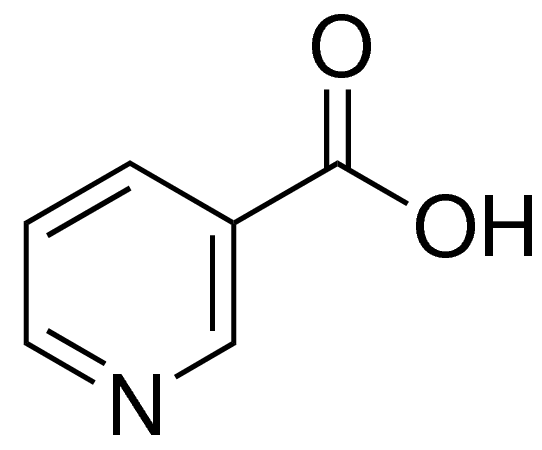NIACIN

NIACIN, also known as nicotinic acid or vitamin B3, is an essential nutrient used in various cosmetic and nutritional products.
Chemical Name: Pyridine-3-carboxylic acid
CAS Number: 59-67-6
Molecular Formula: C6H5NO2
Molecular Weight: 123.11 g/mol
Appearance: White crystalline powder
Solubility: Sparingly soluble in water, soluble in alcohol and alkali solutions
Mechanism of Action:
- Niacin plays a crucial role in various metabolic processes in the body, including energy production and DNA repair.
- It is converted to nicotinamide adenine dinucleotide (NAD) and nicotinamide adenine dinucleotide phosphate (NADP), which are coenzymes involved in numerous enzymatic reactions.
- At pharmacological doses, niacin can also affect lipid metabolism, leading to decreased levels of triglycerides and LDL cholesterol while increasing HDL cholesterol levels.
Key Features and Benefits:
- Essential nutrient for maintaining overall health and preventing niacin deficiency (pellagra).
- Used in the treatment of hyperlipidemia and dyslipidemia.
- May have additional benefits in cardiovascular health, cognitive function, and skin conditions.
Applications:
- Pharmaceutical formulations: Tablets, capsules, extended-release preparations
- Nutritional supplements: Multivitamins, B-complex vitamins
- Food fortification: Added to certain foods to enhance nutritional value
Storage and Handling:
- Store in a tightly closed container in a cool, dry place.
- Protect from light and moisture.
Regulatory Status:
- Approved by major regulatory authorities for use in pharmaceutical products and dietary supplements.
- Subject to specific quality standards and guidelines.
Important Note:
Niacin is intended for use by pharmaceutical and nutraceutical manufacturers and should not be consumed directly. It must be formulated into finished products and administered under the supervision of a healthcare professional. High doses of niacin can cause side effects, such as flushing and liver toxicity.
Please consult with relevant pharmaceutical and food regulations for specific details and requirements for the use of Niacinin product manufacturing.
